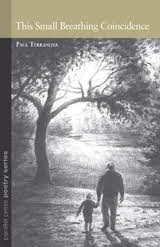Book Review
This Small Breathing Coincidence by Paul Terranova, Parallel Press, 2011. $10
Reviewed by Lisa Vihos
In Paul Terranova’s first chapbook, This Small Breathing Coincidence, particle physics meets the everyday to form thoughtful meditations on existence. His poems touch a chord because he so often locates the mundane place from which they start: a question asked by a child, a glimpse of the moon while shoveling snow before dawn, a church built of Legos, or an embarrassing moment at a poetry reading. Through straight-forward language and a storytelling kind of free verse, he transforms the commonplace into little gems of wonderment.
Terranova’s poems, or at least their seeds, appear to come to him often in the early morning, those moments before 5:00 a.m. when children struggle “against sleep” or cry out in their beds. In the poem, “This Cordless Love,” he writes,
…Sleep wafts in and my
metaphors start to glide into
each other
This sense of “gliding into/each other” is a theme in several of his poems. He frequently ponders the way we blur, for example in the title poem, “This Small Breathing Coincidence,” as he cuddles a sleeping son, he is struck with the thought that:
Our/electrons collide to keep us from
overlapping, but you have to wonder
if they occasionally pass, dance, and
part more amicably….
Further on in the poem, he reinforces the notion that we are not so much stuff, as we are the emptiness and “the ache” in between the stuff:
We are mostly the spaces between,
charged with desire, something
more basic than electrons…
In another poem, “Invisible Clouds of Us,” he writes:
We have been breathing each other
in and out, exchanging molecules over
breakfast and on the interstate for fifteen years.
and further,
I want a satellite map of our love, the
precise places our souls overlap, the vast
rainforests of our children…
Terranova is continuously working to pinpoint the intangible, and by asking his questions, he sends us in the direction of our own answers. The answers never seem to come when we grab at them, but only when we let them slip through. In “Questions About Enlightenment,” a Zen master somewhere in North Carolina says to a pesky retreatant from Laos:
…Enlightenment
is like Raleigh. You know where it is,
but it is very difficult to get there.
While Terranova touches on a variety of subjects, it seems to be the poems spurred by the doings of his children that most often fuel his pen. While only a child can demand the need to visit a bathroom or interrupt the reading of a poem with a many-eyed Play-Doh boa constrictor, only an observant poet like Terranova can pluck those moments, add them to several other disparately related moments and thus create the humorous and thoughtful poem, “An Apology to the Poet Laureate of the United States from the Poet Laureate of 1236 Spaight Street.”
Terranova is a poet of the mind and of the senses. He can take a child’s question about the origin of language and weave it into a fanciful tale that becomes entirely plausible. Like Proust with his madeleine, Terranova can start with a scent and take us on a journey to a distant place. In “Peaches,” he begins with the scent that emanates from a bowl of fruit, pulling him into childhood, summer, and a lawn in Cleveland; that it is his memory is no matter. Through his concise use of language and imagery, he deftly manages to make it our memory as well.
This Small Breathing Coincidence is a compelling debut from the mind and heart of a promising poet. Reading this chapbook leaves me eager for more of Terranova’s very fine poems. Let’s hope we don’t have to wait too long for the next communiqué from his land of Legos and enlightenment, where the subatomic and the solid meet.
Lisa Vihos’s poems have appeared previously in Verse Wisconsin, and in Free Verse, Lakefire, Wisconsin People and Ideas, Seems,and Big Muddy. She is an associate editor of Stoneboat. She resides in Sheboygan with her 13-year-old son. http://www.lisapoemoftheweek.blogspot.com/.


